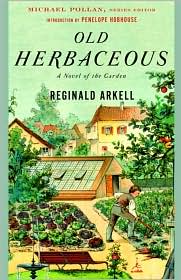
When traveling somewhere, it always feels good knowing that you know someone at your destination who knows the lay of the land. You can put away the guide books and just enjoy the sights. I felt like a traveler when I first opened Old Herbaceous. Subtitled "A Novel of the Garden," and set in England at the dusk of the Victorian era, I entered another world, one that has a trusted guide in Reginal Arkell. And having no clue about gardens, I had been introduced to a different country and culture than my suburbanite one.
Old Herbaceous is one of those novellas that hardly feels short, though it doesn't read long. The story is rich and covers the eight decades of Herbert Pinnegar's life, passing through youth, two wars and eventually old age. We read about his triumphs and struggles and learn volumes about him in just twenty chapters and one hundred fifty pages. Though some novellas revel in experimentation, Old Herbaceous tells a story. Nothing fancy, no tricks, no smoke and mirrors.
In the middle of Old Herbaceous lies the heart of the Pinnegar. About early strawberries and blue morning glories and touched with the dew of insight and respectful love, Chapter Ten is where we fall for him. We see into his true nature and know what kind of character we are dealing with. Although in general he can be crotchety, his heart is as well-kept and as beautiful as his garden.
One aspect I particularly enjoy about good novellas is that, like poetry, they can make apothegmatic observations. Here is one such garden gnome, "If you peel the years from a man's life, as you would the leaves from a globe artichoke, you would find him having his happiest time between the ages of fifty and sixty-five." This notion is exanded upon in a well-wrought passage, but I'll leave you with the pleasure of finding out how -- and there are more tidbits on gardening and human nature sprinkled throughout the novella.
I am an outsider when it comes to being outside. Part it has to do with living in a hostile and hot and humid climate, one that attracts virus-ridden mosquitoes, and part of it has to do with allergies and rashes. I like the idea of being outside, but being outside is always a bad idea. Mind that I have been in gardens, but I haven't a clue as to what the various names of the flowers and whatnot are. I can identify a rose and a dandelion and maybe an orchid, but I haven't a clue about morning glories or annuals or any Latinate flower. Colorblind, though not morbidly so, most of the intricate and delicate colors of the garden are lost on me.
One can only imagine what Herbert Pinnegar, the seasoned and wise gardener protagonist, would have thought of someone like me. Not much, I'm sure. But I will tell you what I think: I'm rather fond of him. It's difficult not to admire someone who finds his vocation early in life, excels at it throughout life, and is still passionate about it at the end of life -- even if that someone is only a fictional character. The greatest fictional characters are ones who we know do not exist in fact, though we feel that they nonetheless exist. Like Huck Finn or Jeeves, Pinnegar recalls those characters we've met and heard about in stories and also in life. We know that a character like Pinnegar is but a fictional creation, yet we feel that he is also just down the street tending his garden.




1 comment:
I have a lot of respect for authors who can tell a good story (especially spanning a lifetime!) in so few pages. THAT is talent. Sounds like a great book!
Post a Comment